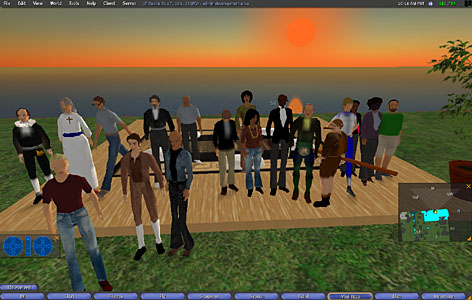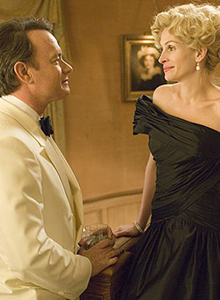Ben Stein has accomplished his goal — he has people talking about how we decide what will be taught and studied as science. If he has accomplished the feat of getting people thinking and listening as well, that will be a great achievement.
The problem is that the people at the farthest reaches of the two approaches to the issue are not just not listening; they are not speaking the same language. One side says: science is about what we can test, measure, and prove according to settled and established principles of the scientific method. The other side says: we think that should include the idea of Intelligent Design. One side says it would be like teaching French in geometry or going to a pizza parlor and ordering a car. The other side says that those distinctions are not important. Both sides feel impatient and not listened to.
Ben Stein is trying to make the argument about freedom of speech instead of the scientific validity of the concept. He says that Intelligent Design might be right or wrong, but why not include it in the conversation? The science community says that there are many ideas we do not teach in science: astrology, phrenology, alchemy. For them, this is not an issue of freedom of speech. Intelligent Design is not excluded because people do not like the idea. It is excluded because it cannot be tested according to the scientific method. Intelligent Design is deduced from the complexity of biological structures and the unresolved areas that science has yet to (and may never) reach. Until it can be tested, measured, and proven according to the same protocols that all of science is constantly subjected to, it is excluded. Not every exclusion is an act of censorship. Sometimes it is the exercise of judgment based on the merits. As Valerie Tarico (raised as a fundamentalist, now a writer for exchristian.net, the Huffington Post and other publications, said, “somebody needs to gently remind Stein and his creationist cronies that they haven’t been expelled from school, they flunked.”
Or, as noted in the Kitzmiller decision:
hile ID arguments may be true, a proposition on which the Court takes no position, ID is not science. We find that ID fails on three different levels, any one of which is sufficient to preclude a determination that ID is science.
They are: (1) ID violates the centuries-old ground rules of science by invoking and permitting supernatural causation;
(2) the argument of irreducible complexity, central to ID, employs the same flawed and illogical contrived dualism that doomed creation science in the 1980’s; and
(3) ID’s negative attacks on evolution have been refuted by the scientific community.
As we will discuss in more detail below, it is additionally important to note that ID has failed to gain acceptance in the scientific community, it has not generated peer-reviewed publications, nor has it been the subject of testing and research. Expert testimony reveals that since the scientific revolution of the 16th and 17th centuries, science has been limited to the search for natural causes to explain natural phenomena.
Intelligent Design supporters might like to change the scope or definition of science, but until they do, or until they find a way to subject Intelligent Design concepts to the kinds of tests required by the scientific method, they will not be able to call it science.
Both the people in the movie and the people criticizing the movie have taken some extreme positions. Stein tries to tie Darwin to the Holocaust. The twisted minds behind Nazi genocide perverted any ideas they used. Some on the side of science go to extremes in arguing that because science cannot prove there is a God, the concept is a “delusion.” These are a distraction from the real question and only show that the issue is one that can inspire a lot of emotion.
The real question is not whether Intelligent Design is true or even whether it is an idea worth studying and discussing. The only question at issue here is whether it is science, and both science and law have determined that it is not.
One thing that troubles me in particular is when people dismiss the other side by name-calling, most absurdly claiming that Judge John E. Jones III, who decided the Kitzmiller v. Dover case (finding that Intelligent Design is not science) is a liberal activist who parroted (one commenter even said “plagiarized from”) the ACLU because they do not like his decision. Jones is a Republican who was appointed by George W. Bush. As all judges do, he relied on the materials submitted by the parties to draft his decision. It is activist judges who depart from the filings made by the parties to create their own arguments in a judicial decision.
Another thing that troubles me is the inability or unwillingness of some people on both sides to state the other side’s position in a way that is acceptable to them. That is an indispensable element of making a credible argument. You can tell a great deal about the validity of an argument and the credibility of the person making it by how he or she treats the other side. Sarcasm? Insults? Distortion? Generally indicators of uncertainty and emotion triumphing over logic.
As I noted in my comments, I do not see a conflict between the scientific understanding of the origins of life and Intelligent Design. To me, one picks up where the other leaves off. Scientists admit that they do not know what force was behind the origin of life and are unlikely to find out — using the scientific method. Intelligent Design is one way to think about what the possibilities are. One is science and one is religion, philosophy, and metaphysics. Put it this way: Whether God created life is the subject of philosophy and religion. Why God created life is the subject of philosophy, religion, political science, literature, anthropology, and more. Science is not about the whether and the why of creation but the how.
We are not going to settle the argument here. But I ask the people who care so much about this issue to think carefully about what it means to know something and how we choose what and who we believe. And I ask them to remember that it is easier to listen to those who express their views with kindness, patience, and respect.
(more…)

 In the past, therapists have worked with autistic children through role playing, stories, and rules. But the brain changes not by learning rules but by engaging in activities. Sandy Chapman had the idea to use virtual reality to immerse the patients in the environments that are similar to real life. It is not really role playing because they become the character. It adds a little more realism to the therapy aspect. In role playing it is hard to get past the fact that you’re playing with the therapist, but in virtual reality it is more like meeting for the first time and building a relationship.
In the past, therapists have worked with autistic children through role playing, stories, and rules. But the brain changes not by learning rules but by engaging in activities. Sandy Chapman had the idea to use virtual reality to immerse the patients in the environments that are similar to real life. It is not really role playing because they become the character. It adds a little more realism to the therapy aspect. In role playing it is hard to get past the fact that you’re playing with the therapist, but in virtual reality it is more like meeting for the first time and building a relationship. It is not easy to take a wealthy socialite, a powerful Congressman, and a CIA agent, have them played by three Oscar-winners, two who are genuine box office gold, and make them look like the underdogs, but in this “extraordinary story of how the wildest man in Congress and a rogue CIA agent changed the history of our times” (as put in the unusually accurate book subtitle), that is what they are.
It is not easy to take a wealthy socialite, a powerful Congressman, and a CIA agent, have them played by three Oscar-winners, two who are genuine box office gold, and make them look like the underdogs, but in this “extraordinary story of how the wildest man in Congress and a rogue CIA agent changed the history of our times” (as put in the unusually accurate book subtitle), that is what they are.